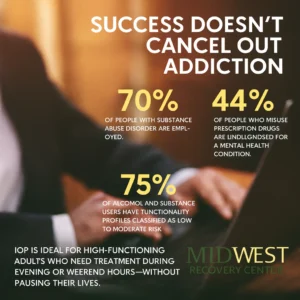You show up early. You check your email on the treadmill. You close the deal, get the kids to school, hit the gym, and still make dinner. You do all the things—and you do them well.
And then you pour a drink just to slow your brain down. Or you pop a pill before meetings to keep your edge sharp. Or you find yourself scrolling online, trying to figure out if what you’re doing counts as addiction.
Here’s the truth: high-functioning doesn’t mean healthy. And managing addiction with a calendar full of accomplishments doesn’t mean you don’t need help.
That’s where IOP—Intensive Outpatient Programming—comes in.
At Midwest Recovery Center in Toledo, we work with high-functioning clients every day. People whose lives look fine but feel like they’re unraveling under the surface. This isn’t about dramatic collapse. It’s about slow-burn suffering—the kind that’s easy to hide but hard to heal from alone.
Success Doesn’t Cancel Out Addiction
One of the most damaging beliefs in high-functioning addiction is this:
If I’m still getting things done, it can’t be that bad.
But addiction doesn’t always start with losing everything. Sometimes it starts with needing something to make success feel bearable.
Maybe that glass of wine went from celebration to self-soothing.
Maybe your prescription pills became your secret assistant.
Maybe you’re numbing to keep up—not falling apart.
But the line doesn’t have to be dramatic to be dangerous.
And if you’ve ever found yourself thinking, I can stop… just not this week, you’re closer to that line than you think.
What Is IOP, and Why Does It Work for High-Functioning Adults?
IOP (Intensive Outpatient Program) is a flexible form of addiction treatment designed to help you recover without leaving your life behind.
Unlike inpatient programs, IOP doesn’t require you to check into a facility 24/7. Instead, you attend structured therapy multiple times per week—typically during evenings or non-working hours—so you can keep working, parenting, and living while still receiving clinical support.
At Midwest Recovery, we tailor IOP to meet the unique demands of high-functioning clients. That includes:
- Evening and weekend scheduling
- Individual and group therapy that address professional stressors
- Confidential support for career-related fears and family dynamics
We also see many clients from surrounding areas like Maumee, Ohio, Perrysburg, and Oregon, Ohio—people with full lives, complicated schedules, and a quiet need for change.

The Double Life Is Exhausting
You probably haven’t told anyone what’s really going on.
Maybe your partner knows something’s off.
Maybe your assistant has started covering for you.
Maybe you’ve gotten good at hiding it even from yourself.
But the energy it takes to maintain the illusion? It’s draining you.
High-functioning addiction means living two lives—one for public approval, one for private survival. And the cost of that split shows up slowly:
- Waking up with anxiety that lasts all day
- Wondering if people would still respect you if they knew
- Feeling like a fraud no matter how much you accomplish
IOP helps you reconcile those two lives into one honest, sustainable reality.
You Don’t Need to Hit Bottom to Qualify
In fact, that’s the whole point.
IOP exists so you don’t have to lose everything first.
It’s early intervention for people who are smart enough to realize:
Just because I’m still functioning doesn’t mean I’m thriving.
Most of our IOP clients never faced a dramatic collapse. No DUI. No rehab ultimatum. Just a quiet moment of clarity—sitting at their desk, or in the car, or on vacation with their kids—realizing:
I don’t want to need this anymore.
That moment of awareness? That’s the beginning of freedom.
You’re Not the Exception to the Rule
We hear it all the time from high-functioning clients:
- “I know what therapy will say. I’ve read the books.”
- “I’m not like those people. I’m managing this.”
- “This is just how I unwind. It’s not affecting anyone.”
But intelligence isn’t immunity.
Education doesn’t eliminate emotional pain.
And perfectionism often masks the deepest shame.
IOP isn’t just about stopping use—it’s about retraining the nervous system that told you hustle equals worth. That substances are the only way to feel calm. That no one else could possibly understand how tightly you’ve wound your life to hold it all together.
You’re not too unique to recover.
You’re just tired enough to need something different.
Healing Doesn’t Have to Derail Your Life
A lot of high-functioning adults fear that getting help will wreck everything they’ve worked for. But IOP does the opposite.
It lets you keep showing up for your responsibilities—while finally starting to show up for yourself.
At Midwest Recovery, we’ve designed our IOP services to work with your life, not against it. That means:
- Personalized treatment planning
- Practical tools for managing stress and burnout
- Therapy that helps you respond, not react
- A team that understands high-functioning doesn’t mean emotionally invincible
You don’t have to choose between your career and your clarity.
You just have to choose to start.
FAQ: High-Functioning Addiction and IOP
How do I know if I’m “bad enough” for IOP?
You don’t need to be “bad enough”—you just need to be ready. If you’re hiding your use, if you’ve tried to quit and couldn’t, if substances are becoming a need instead of a choice—IOP is appropriate.
Will this affect my job or professional license?
IOP is confidential and protected under HIPAA. In many cases, clients choose evening sessions to avoid disrupting work. If disclosure is required for medical leave, our team can support that process discreetly.
Can I still take care of my kids while doing IOP?
Yes. Many of our clients are parents. IOP is structured to allow participation while maintaining home and family responsibilities.
Is IOP just about stopping the substance?
No. Our IOP addresses co-occurring issues like anxiety, depression, trauma, and burnout—especially common in high-functioning clients. It’s about creating a life where substances aren’t necessary to feel okay.
What happens after IOP?
IOP is often followed by step-down care, like weekly therapy or recovery groups. We’ll help you build a plan that fits your life—and protects your progress.
One Final Thought for the Overachievers Holding It All Together
You’ve learned to perform success even while your insides are screaming.
You’ve achieved things that would impress anyone—except maybe yourself.
You’ve mastered the art of staying one step ahead of collapse.
But here’s the thing: you don’t have to earn your way into healing.
You don’t have to hit bottom.
You don’t have to quit your job.
You don’t have to “deserve” help more than someone else.
You just have to want something better than the secret life you’re living now.
IOP exists for you. For people who don’t fit the stereotype. For people who are done pretending. For people who need a way out that still lets them stay in their life.
You don’t have to break your life to change it.
Call (888) 657-0858 to learn more about our IOP services in Toledo, Ohio.


























